RASMI RANJAN DAS | UMA MAHESWARI R
The year 2023 is an extremely important year for international taxation as more than a hundred year old tax codes are being re-written through multilateral cooperation. International community has been categorical that the existing tax laws are near obsolete and thus cannot address the tax challenges of the ever increasing digitalization and globalization of the economy. Resultantly, the powers of Multilateralism have been exemplified in international tax cooperation, beginning with the Base Erosion and Profit Shifting project. Huge efforts are being made in framing the solutions to address challenges of the digital economy. Tax policy reform, however, is just the beginning for capacity-constrained and small taxadministrations.
Indian Presidency identified increasing tax capacities of developing countries as core to the success of any transformation of international tax architecture- achieving growth and improving domestic resource mobilization goals being the concomitant gains.Strategizing for enhancingtax capacities must essentially precede implementation efforts to ensure broader achievement of sustainable development goals for developing member countries. Capacity building is also a critical core to true multilateralism –that ensures that no tax jurisdiction is left behind in benefitting from the envisaged reforms.
Being at the cusp of the transformation of international tax architecture, the benefits of the participating developing member jurisdictions in the present reform can be realized only through effective participation in the very design of the reform. Enhancing participative capabilities of tax administrations from developing countries is crucial to ensure that international negotiations result in a tax design that is fair, modern and equitable. Moving beyond the core tax policy, building tax capacities also allows jurisdictions to make a policy choice informed by empirical analysis. This is of critical importance as many developing jurisdictions, in the past, have paid a massive cost by adopting ‘bad policies’- i.e., policies not suitable or appropriate for their jurisdictions.
Towards enhancing participative capacities of tax administrations as well as enabling policy choices for an equitable tax reform, particularly for developing member jurisdictions, the Indian Presidency organized the first domestic event on understanding the ramifications of the Two Pillar Solution for the Global South in June, 2023 in collaboration with South Centre, a Geneva based forum of developing countries.Strengthened by the success of the first event, the Presidency organized a three-day regional workshop on International Taxation from 3rd to 5th October, 2023 in collaboration with the Asian Development Bank and the World Bank, under the Asia Pacific Tax Hub framework. The event was attended by tax administrators and policymakers from around 20 developing countries in the Asia Pacific region, including delegates from member states not participating in the currentnegotiations under the aegis of the OECD/G20 Inclusive Framework.
Having successfully conducted various domestic and international capacity building events, the Presidency identified the importance of involving the G20 Membership in a high level policy dialogue on capacity building and the two-pillar solution. Partnering with the International Monetary Fund(IMF), the G20-IMF High Level Dialogue on Capacity Building and the Two-Pillar Solution was designed to evince a truly multilateral strategy to enhance tax capacities across jurisdictions. The policy dialogue, held on the sidelines of the 4th G20 Finance Ministers and Central Bank Governors Meeting in October 2023, brought together the Deputies and representatives from all G20 member countries, invitee countries and international organizations.
Speaking at the event, the IMF made the case for anchoring the dialogue for enhancing tax capacities on the important indices of foundations for implementing international tax reforms, simplification, redesigning tax incentives and wider reform priorities while also emphasizing the Fund’s commitment in collaborating to support reform and its implementation with all stakeholders. The OECD in its address rightly acknowledged that there cannot be a one-size-fits for all approach when it comes to implementation support and detailed the implementation support efforts carried out through the Tax Inspectors Without Borders(TIWB) initiative.
The panellists from the United Nations, the United Kingdom, Indonesia and the World Bank discussed the broad agenda for capacity building in relation to the two-pillar international tax package and highlighted the feasibility and potential impact on developing countries of strategic responses, such as the adoption and design of optional provisions in the two-pillar package, the use of simplified approaches to protect the corporate tax base (depending on capacity), and redesign of investment tax incentives.The United Nations importantly remarked that what developing countries need,may be easily addressed through instruments like the Withholding Taxes. United Nations went on to add that the speed of implementation of any international tax reform needs to be necessarily different given the wide variations in tax capacities across member jurisdictions.
Indian Presidency, with increasing tax capacities of developing jurisdictions as an important priority, through the year long Presidency pursued capacity building at all levels, both through actual training by partnering with international organizations as well as through strategizing for enhancing tax capacities alongside all stakeholders.The importance of augmenting tax capacity of developing countries is underscored byaSeptember,2023 Staff discussion note of the IMF that finds that ‘a staggering 9 percentage point increase in the tax-to-GDP ratio is feasible through a combination of a tax system reform and institutional capacity building’, especially in the context of Low Income Developing Countries (LIDCs). Indian Presidency’s strategy to couple tax policy reform with an equal prioritization on capacity building through year 2023 has built in a structural stimulus to augment revenues for developing countries. ThePresidency has invested well in building tax capacities of the developing member countries in order that the developing countries can finance their own sustainable development goals without looking outside.
India, beyond the Presidency calendar year, will continue to partner with all institutional stakeholders and interested member countries to enhance tax capacities of developing countries wholistically. Taxation will be an integral part of our growth story and will be key to the Global South in its domestic resource mobilization efforts for a human-centric development.
(Rasmi Ranjan Das is Chief Commissioner of Income-tax and Uma Maheswari R is Additional Commissioner of Income-tax, Government of India. These are the authors’ personal views)





